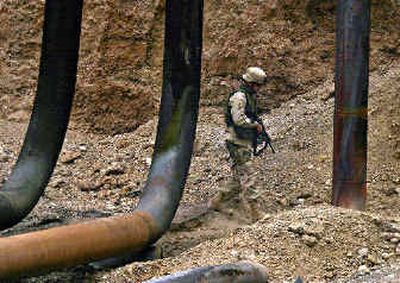Iraqis face daily power shortages

BAGHDAD, Iraq – When his lights and television go dark, as they regularly do, Khalid Qasim Ali flips a switch in his living room to bring back the power. This electricity is not state-supplied. Instead, it comes from a generator three blocks away that is connected to Ali’s home by a wire strung in the air.
All told, 107 families in Baghdad’s working-class neighborhood of Topchi are hooked up to the generator. The arrangement gives them power during blackouts. It also darkens the skies over Topchi with a tangled skein of unsightly, dangerous cables. Like everyone else, Ali is billed by the ampere. He pays the generator’s owner around $10 a month.
“We should enjoy electricity without using a generator because Iraq is a wealthy country,” said Ali, 65, a retired truck driver. “Regretfully, the Americans did nothing since they came.”
Thousands of roaring generators in Iraqi back yards, driveways and street corners demonstrate that after two years and at least $1.2 billion, the U.S. effort to resuscitate Iraq’s electrical system is still wide of its mark. The national grid’s average daily output of 4,000-4,200 megawatts falls below its prewar level of about 4,400 megawatts.
The shortage is a source of public anger and dissatisfaction, as seen in a recent poll by the International Republican Institute, a U.S.-funded nonprofit group that promotes democracy.
Asked what the government’s priorities should be, Iraqis put “inadequate electricity” first, ahead of “crime,” which was fourth, “the presence of coalition forces,” which ranked seventh, and “terrorists,” which ranked eighth.
Nothing has done more to puncture Iraqis’ once-widespread belief in Americans’ technological superiority than their inability to revive the power system, vital for Iraq’s oil industry.
There are many reasons for the slow pace, from flawed planning by the United States early on, to continuing sabotage by insurgents. In addition, with the establishment of an interim government in June, U.S. officials said they had to work more closely with Iraqi electricity officials who were not always as efficient or as willing to take on responsibility as the Americans had hoped.
With a scorching summer approaching, Iraqi and U.S. officials are worried about the shortage.